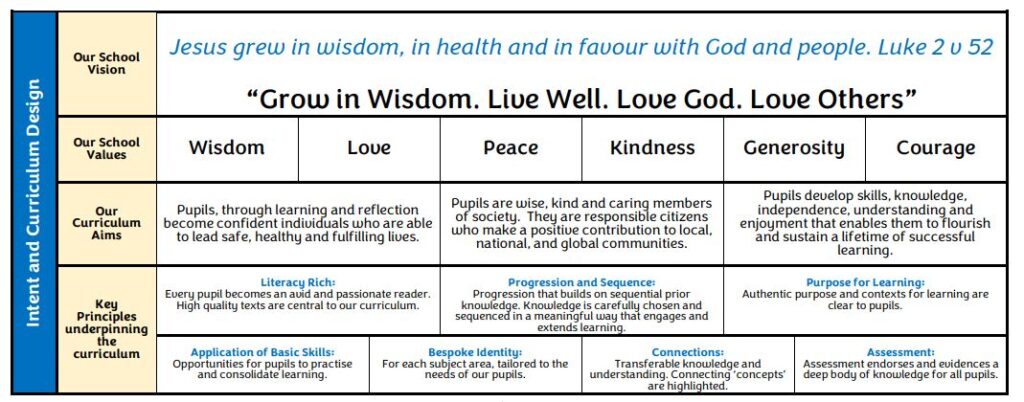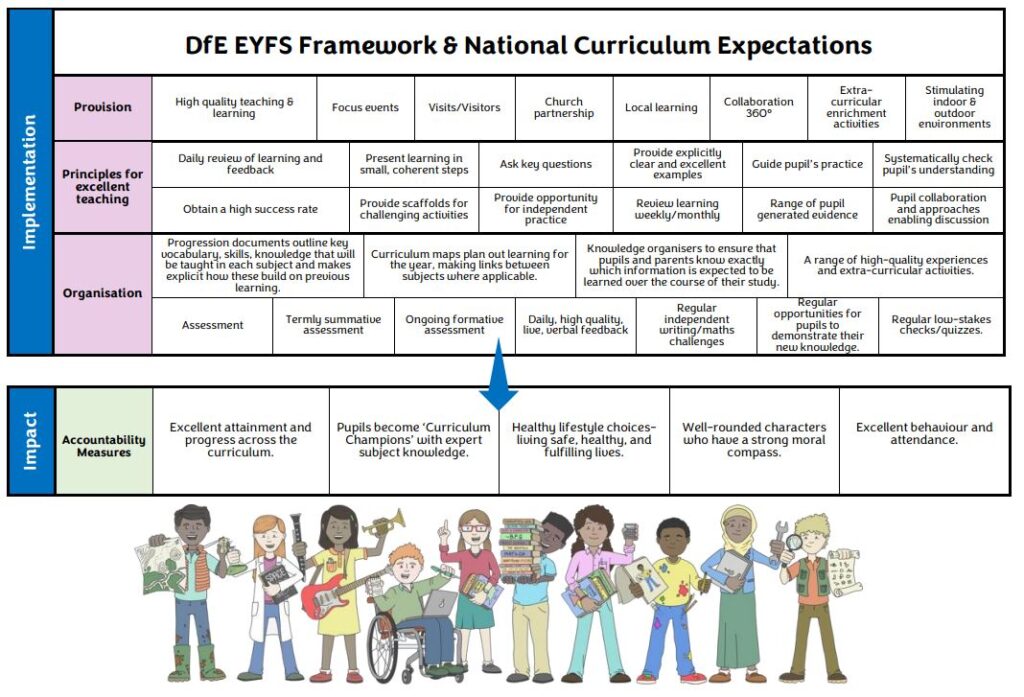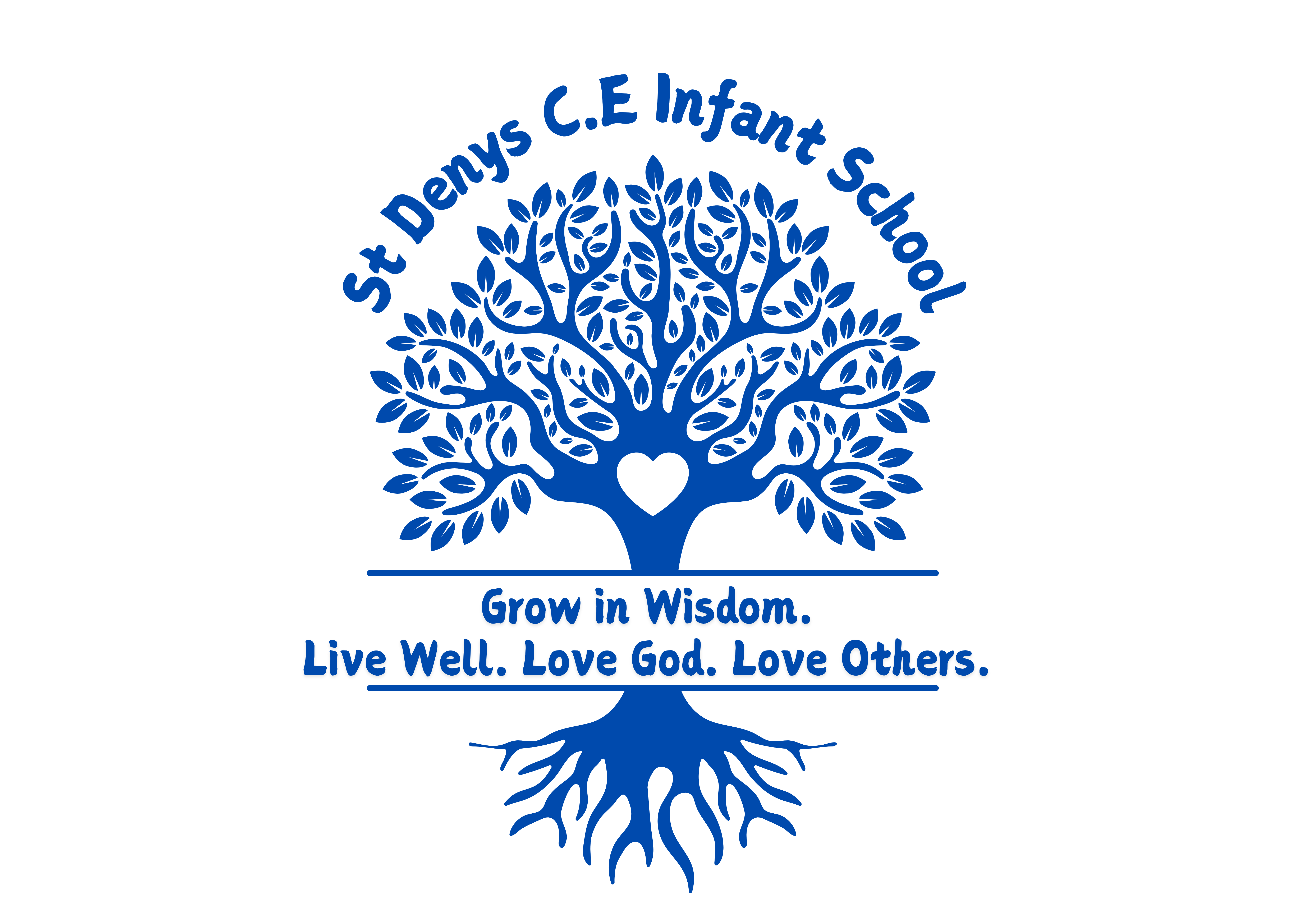Rationale
Our school is a community of faith where we believe, achieve and grow together; this is core to our curriculum. We are a caring community whose values are built on mutual trust and respect.
To maximise success and achievement, all pupils and staff are fully committed to our core Christian values.
The curriculum we offer is bespoke to the needs of all our learners; it has been created to support the way in which the members of the school can flourish together in a supportive way.
We believe that our core Christian values play a key role in the delivery of effective teaching and learning at St Denys.
Our Curriculum Aims
At St Denys CE Infant School, we place a sharp focus on the delivery of a carefully crafted curriculum which expands the potential of our learning community through:
- An immersive and collaborative curriculum
- Creative and purposeful learning opportunities that stimulate our learners
- Curiosity and critical thinking
Our rigorous, well-planned curriculum, combined with high quality teaching and resourcing, ensures that children are supported to be well-rounded, empathetic young people who have a genuine thirst for learning. Children develop a strong sense of moral purpose in addition to a respect for- and understanding of- people.
The curriculum encompasses the planned activities that we as a school organise in order to promote learning, personal growth and development. It includes not only the formal requirements of the National Curriculum, but also a range of extra- curricular activities, that the school organises, in order to enrich the experiences of our children. We also have a commitment to ensuring all our children flourish through ‘essential learning experiences. Embedded in our ‘hidden’ curriculum is the transmission of values and beliefs that the children learn from the way they are treated and expected to behave.
We aim to teach children how to grow into positive, responsible people who can work and co-operate with others, whilst developing knowledge, skills and attitudes towards learning, in order to unlock their true potential.
Our Curriculum Intent

It is our aim that the pupils of St Denys CE Infant School will embrace new learning opportunities, and through these experiences, pupils will be empowered to become responsible, resilient, open-minded, and well-rounded individuals who will have a positive impact on society. We have designed and implemented a curriculum specifically with this in mind. Through this, we aim to stimulate their imagination, develop empathy, critical thinking and creativity, and open their minds to global issues.
Through a sequentially organised curriculum and high-quality teaching and learning, we aim to offer creative, challenging and inspiring opportunities to reflect our vision as a community of faith, where we believe ‘Each one of us is different. Each one of us is special’. Raising aspirations and enabling our pupils to become the best version of themselves is central to who we are.
At the heart of all our learning is our focus as a reading school. Therefore, we have implemented a curriculum that will not only build their confidence as learners, but also provide relevant experiences to develop their fundamental reading skills.
- Our curriculum creates inquisitive, resilient and ambitious learners.
- Our pupils are confident, enjoy learning, make progress and achieve.
- Our curriculum is inclusive and appreciates the diversity of cultures and religions in Modern Britain.
- Our curriculum is literacy rich and provides our children with opportunities to read widely and often.
- Our curriculum develops the skills, attitudes and knowledge for a successful life within and beyond St Denys.
Our Curriculum Implementation

Find out more about each of our curriculum subjects by clicking the buttons below:
The St Denys Curriculum Champions
What we know about how children learn, is that when we teach children skills and knowledge in isolation, like punctuation in English, they rarely make links to other subjects. Even when they are writing about Ancient Egypt in History or how plants grow in Science, they tend to forget how apply the same English skills.
This is in part because the information stored in the brain is locked up in the ‘English box’, and why would they open that box when they are in History or Science?
The concept of ‘being rather than doing’ moves away from content in subject boxes and uses clusters of knowledge and concepts that can easily be applied between disciplines. By learning how to punctuate as an Author, they can use this knowledge when they are being Scientists as they start to understand that Scientists also need to write to convey what they have discovered.
This focus on the language of English relating to being an Author is important, and something that will happen throughout the school.
‘Being’ rather than ‘Doing’:
| English (Reading & Writing) | becomes… | Author |
| Maths | becomes… | Mathematician |
| Science | becomes… | Scientist |
| History | becomes… | Historian |
| Geography | becomes… | Geographer |
| Design Technology | becomes… | Engineer/Food Engineer |
| Computing | becomes… | Digital Engineer |
| Art | becomes… | Artist |
| Music | becomes… | Musician |
| Physical Education (P.E) | becomes… | Athlete |
| Religious Education (R.E) | becomes… | Philosopher/Theologian |
| Personal, Social, Health & Relationships (PSHE) | becomes… | Philosopher |
There are other reasons for using the ‘being’ approach, such as making links to the outside world where Environmental Scientists for instance, use a blend of science, mathematics, geography and engineering.
They will inevitably start discussions about what children want to be when they grow up. It opens up the notion that most jobs and careers do not just use one subject, they are a blend.
It also helps us to explore role models and to invite people from the local community into school to talk about how they are Artists or Historians, for instance, and the blend of skills they use in their work.
